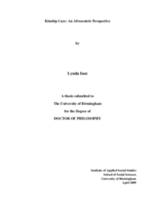ABSTRACT
This thesis explores the experiences and meanings that are attributed to kinship care by caregivers, young people of African descent, and social workers. It examined the meanings each group attached to kinship care and the risk and resilience they saw within it. The research was framed within the culturally distinctive theoretical framework of the Afrocentric paradigm which encapsulates cultural values. A qualitative approach was adopted for data collection, using interviews, and aspects of Grounded Theory for data analysis. The findings show that kinship care is a survival strategy that has historical significance for people of African descent, because it is linked to a tradition of help and a broad base of support. The study found that while local authorities were formally placing children with their relatives, there was a distinct lack of policy development to support kinship care as a welfare service. The absence of clearly identified support structures, tools for assessment, training and monitoring increased the risk factors for children who were placed in kinship care. Resilience was transferred through the Afrocentric cultural values, a key factor that led to family preservation and placement stability. The study concluded that there is an urgent need to reframe policy and practice.

